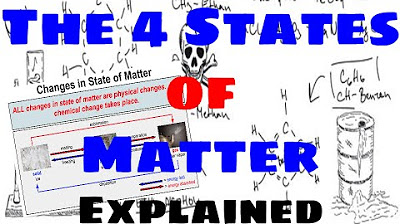Changes of state | Melting, Boiling, Evaporating, Freezing and Condensing | #chemistry
Summary
TLDRThe video explains changes of state, such as melting, freezing, boiling, and condensation, through the lens of Kinetic Particle Theory. It highlights how the energy of particles increases or decreases during these changes, affecting their motion and the forces between them. The theory illustrates how particles in solids, liquids, and gases behave differently, and how temperature influences these transitions. This approach provides a clearer understanding of everyday phenomena like boiling water or ice melting by focusing on the behavior of particles at a microscopic level.
Takeaways
- 💧 Matter consists of small particles in constant motion.
- 🌡️ The temperature of a substance is directly related to the average kinetic energy of its particles.
- 🔥 When heated, particles gain kinetic energy, move faster, and can change state, such as from solid to liquid or liquid to gas.
- ❄️ Cooling reduces particle movement, causing the substance to change from gas to liquid or liquid to solid.
- 🔄 Changes of state (melting, boiling, freezing, etc.) are physical changes and do not affect the chemical composition of the substance.
- 🧊 In a solid, particles are tightly packed in a fixed position but vibrate slightly.
- 🌊 In a liquid, particles are still close together but can move past each other, allowing liquids to flow.
- 💨 In a gas, particles are far apart and move freely, filling the container they are in.
- ⚖️ The mass of a substance remains the same during a change of state (conservation of mass).
- 🌍 Changes of state can occur naturally in our environment, like evaporation, condensation, and sublimation.
Q & A
What is Kinetic Particle Theory?
-Kinetic Particle Theory explains that all matter is made up of particles (atoms or molecules) which are in constant motion. The theory helps explain changes of state and the behavior of gases, liquids, and solids.
How does the Kinetic Particle Theory explain changes of state?
-According to the theory, changes of state occur because of changes in the kinetic energy of particles. When energy is added or removed, it affects how fast the particles move, which causes matter to change from one state (solid, liquid, gas) to another.
What happens to the particles of a substance when it melts?
-During melting, particles gain kinetic energy, move faster, and break free from their fixed positions in a solid structure, turning into a liquid.
Why do substances boil at different temperatures?
-Different substances have different types of bonds between particles, requiring different amounts of energy to break these bonds. The stronger the intermolecular forces, the higher the temperature required to boil the substance.
What occurs at the molecular level during condensation?
-During condensation, particles lose kinetic energy and move more slowly, allowing them to come closer together. This results in the gas changing into a liquid as particles bond more tightly.
What is the significance of kinetic energy in the process of sublimation?
-In sublimation, particles in a solid gain enough kinetic energy to break free directly into the gas phase without passing through the liquid phase.
How does cooling a gas lead to its transformation into a liquid?
-Cooling reduces the kinetic energy of gas particles, causing them to move more slowly and get closer together. This allows intermolecular forces to bring them into a liquid state.
Why do solids have a fixed shape according to the Kinetic Particle Theory?
-In solids, particles have low kinetic energy and are closely packed together in a fixed, orderly arrangement. They only vibrate in place, which gives solids their fixed shape.
How does the theory explain the expansion of gases?
-As the temperature of a gas increases, particles gain kinetic energy and move faster, causing them to spread out and occupy more space, which is observed as expansion.
What role does pressure play in changing the state of matter according to the theory?
-Pressure can force particles closer together, which can influence changes of state, particularly from gas to liquid. Increasing pressure on a gas can cause it to condense into a liquid as particles are forced closer.
Outlines

Cette section est réservée aux utilisateurs payants. Améliorez votre compte pour accéder à cette section.
Améliorer maintenantMindmap

Cette section est réservée aux utilisateurs payants. Améliorez votre compte pour accéder à cette section.
Améliorer maintenantKeywords

Cette section est réservée aux utilisateurs payants. Améliorez votre compte pour accéder à cette section.
Améliorer maintenantHighlights

Cette section est réservée aux utilisateurs payants. Améliorez votre compte pour accéder à cette section.
Améliorer maintenantTranscripts

Cette section est réservée aux utilisateurs payants. Améliorez votre compte pour accéder à cette section.
Améliorer maintenantVoir Plus de Vidéos Connexes

Grade 9 Chemistry Lesson 1 - Matter and the Particle Theory

Kinetic Molecular Theory grade 10 Introduction

SCIENCE 7: Quarter 1-LC 5: PHASE CHANGES OF THE STATES OF MATTER| MATATAG CURRICULUM

Bab 2 Zat dan Perubahannya #2 (Perubahan Wujud Zat) | IPA SMP Kelas 7 | Sekolah Penggerak

The Four States of Matter - Explained

S1.1.2 States of matter, changes of state and state symbols
5.0 / 5 (0 votes)
